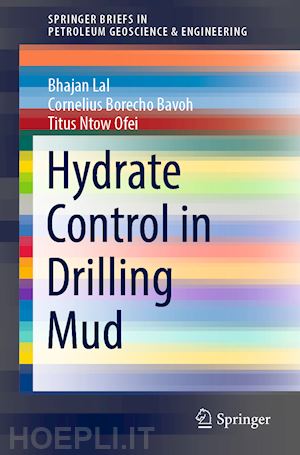

Questo prodotto usufruisce delle SPEDIZIONI GRATIS
selezionando l'opzione Corriere Veloce in fase di ordine.
Pagabile anche con Carta della cultura giovani e del merito, 18App Bonus Cultura e Carta del Docente
This book provides pathways and strategies for mud engineers and drilling students in the future drilling industry. The data on the effect of drilling mud additives on hydrate formation thermodynamics and kinetics are discussed to aid proper additives selection and blending for optimum performance. Practical field operations of hydrate-related drilling are discussed with insights on future drilling operations.
Preface Drilling fluid design is very crucial in all drilling operations. Gas hydrate wells or hydrate sediments are future reservoirs that are believed to produced clean natural gas that will replace the current fossil fuels. Hydrate management has now become a part of the drilling operation and for that matter, relevant knowledge and guidelines of drilling fluid design for hydrate management in drilling-related operations would help establish a strong foundation for hydrate-related drilling operations.
This book is useful to mud engineers, students, and industries who wish to be drilling fluid authorities in the21st-century energy production industry.
Dr. Titus Ntow Ofei is a PIRE research fellow and the lead researcher on particle sedimentation in oil-based drilling fluids at the Department of Geoscience and Petroleum, Norwegian University of Science and Technology. He has more than 8 years of experience in teaching and research in both Malaysia and Norway. Dr. Ofei formerly worked as a senior lecturer at the Petroleum Engineering Department, University Teknologi PETRONAS from 2014 to 2018. Through international collaborations, he secured and executed 6 research projects, supervised more than 30 students, and published more than 40 scientific papers in peer-reviewed journals, conferences, and book chapters. Dr Ofei holds PhD and MSc. degrees in petroleum engineering and BSc. (Hons) degree in mechanical engineering. His research expertise includes drilling fluid technology, rheology, wellbore hydraulics, cuttings transport, experimental and computational fluid dynamics. Dr. Ofei is a member of the Society of Petroleum Engineers (SPE).
Mr. Cornelius Borecho Bavoh is a research fellow, a Ph.D. candidate, and a graduate assistant at the Phase Separation Laboratory of the Research Center for CO2 Capture (RCCO2C) in the Chemical Engineering Department of Universiti Teknologi PETRONAS (UTP), Seri Iskandar, Perak Darul Ridzuan, Malaysia. He has more than 5 years of experience in tutoring and research at the Universiti Teknologi PETRONAS, Malaysia. He has worked on several industrial and fundamental projects related to drilling, gas hydrate, and CO2 capture and separation, and published more than 30 scientific papers in peer-reviewed journals, conferences, and book chapters. Mr. Bavoh holds MSc. degrees in chemical engineering and BSc. (Hons) degree in petroleum engineering. His research expertise includes thermodynamics and kinetics of reservoir fluid phase modeling and characterization, gas hydrate in flow assurance, production of naturally deposited methane hydrates, and application of gas hydrate-based technology in CO2 Capture and natural gas storage and transportation, drilling fluid technology, rheology, and cuttings transport. Mr. Bavoh is a member of the Society of Petroleum Engineers (SPE).











Il sito utilizza cookie ed altri strumenti di tracciamento che raccolgono informazioni dal dispositivo dell’utente. Oltre ai cookie tecnici ed analitici aggregati, strettamente necessari per il funzionamento di questo sito web, previo consenso dell’utente possono essere installati cookie di profilazione e marketing e cookie dei social media. Cliccando su “Accetto tutti i cookie” saranno attivate tutte le categorie di cookie. Per accettare solo deterninate categorie di cookie, cliccare invece su “Impostazioni cookie”. Chiudendo il banner o continuando a navigare saranno installati solo cookie tecnici. Per maggiori dettagli, consultare la Cookie Policy.